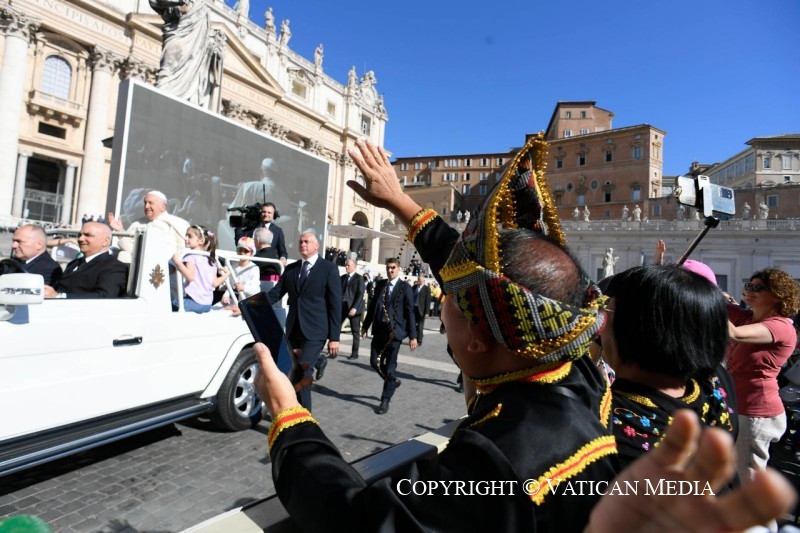Pope: a new courageous financial architecture to heal the debt of poor countries
Francis' appeal in view of the Jubilee entrusted to participants at a meeting promoted by the Pontifical Academy of Social Sciences. ‘No government can morally demand that its people suffer deprivations incompatible with human dignity’. At the general audience the reflection on the freedom that comes from the ‘wind of the Holy Spirit’.
Vatican City (AsiaNews) - The world needs ‘a new international financial architecture that is courageous and creative’ that urgently addresses the issue of the debt of poor countries. Picking up on one of the themes indicated in the Bull of Indiction of the now imminent Jubilee of 2025, Pope Francis returned to urging this commitment this morning as he met - before the usual appointment for the general audience - with the participants at the meeting on the theme ‘Tackling the Debt Crisis in the Global South’, promoted by the Pontifical Academy of Social Sciences.
‘In the wake of mismanaged globalization, and in wake of the pandemic and wars, we find ourselves faced with a debt crisis that mainly affects the countries of the global South, causing misery and distress, and depriving millions of people of the possibility of a dignified future. Consequently, no government can morally require that its people suffer deprivations incompatible with human dignity. In order to try to break the debt-financing cycle, it is necessary to create a multinational mechanism, based on the solidarity and harmony of peoples, that takes into account the global nature of the problem and its economic, financial and social implications. The absence of such a mechanism favours the mentality of “every person for himself or herself”, where the weakest always lose."
It is precisely the Holy Year of 2025,' the Pontiff said, ’that calls us to open our minds and hearts to be able to untie the knots of those bonds that strangle the present, without forgetting that we are only custodians and stewards, not masters. I invite you to dream and act together in the responsible building up of our common home; we cannot inhabit it with a clear conscience when we know that around us is a multitude of brothers and sisters who are hungry and mired in social exclusion and in vulnerability. To let this pass is a sin, a human sin. Even if one does not have faith, it is a social sin’.
Pope Francis then moved to St. Peter's Square for the general audience with pilgrims, during which he continued the new cycle of catechesis begun last week on the theme of the Holy Spirit, dwelling on the name by which the third person of the Trinity is called in the Bible.
‘Spirit,’ he recalled, ‘is the Latinised version. The name of the Spirit, the one by which the first recipients of revelation knew Him, by which the prophets, the psalmists, Mary, Jesus, and the Apostles invoked Him, is Ruach, which means breath, wind, a puff of air. I It is a name that contains ‘the first fundamental revelation about the person and function of the Holy Spirit’. Indeed, the image of the wind serves above all to ‘express the power of the divine Spirit: an overwhelming and indomitable force, capable even of moving oceans’.
But ‘Jesus highlights another characteristic his freedom. To Nicodemus, who visits him at night, he solemnly says: ‘The wind blows where it wills and you hear its voice, but you do not know where it comes from or where it goes: so is everyone who is born of the Spirit’ (Jn 3:8)’.
‘To pretend to enclose the Holy Spirit in concepts, definitions, theses or treatises, as modern rationalism has sometimes attempted to do, is to lose it, nullify it, or reduce it to the purely human spirit, to a simple spirit. There is, however, a similar temptation in the ecclesiastical field, and it is that of wanting to enclose the Holy Spirit in canons, institutions, definitions. The Spirit creates and animates institutions, but He himself cannot be “institutionalised,” “objectified”. The wind blows “where it wills,” so the Spirit distributes its gifts “as it wills” (1 Cor 12:11).
"A freedom that is ‘not freedom to do what one wants, but freedom to freely do what God wants. Not freedom to do good or evil, but freedom to do good and do it freely, that is, by attraction, not by compulsion. In other words, freedom of children, not of slaves’. And it is a freedom that - Paul went on to explain - is not ‘a pretext for the flesh’ but ‘service to one another’. ‘We ask Jesus,’ he concluded, ‘to make us, through his Holy Spirit, truly free men and women. Free to serve, in love and joy’.
In his greetings to the groups of pilgrims, finally, Pope Francis - in the month dedicated to the Sacred Heart of Jesus - announced that he is writing a new document dedicated to this form of devotion inaugurated 350 years ago by the first manifestation to St Margaret Mary Alacoque and that it will be published in September. ‘It will do us much good,’ he commented, ‘to meditate on various aspects of the Lord's love that can illuminate the path of ecclesial renewal; but also that can say something meaningful to a world that seems to have lost its heart’.







.png)










